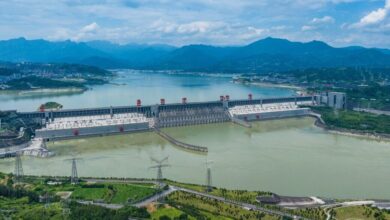How Ukraine intends to continue its agricultural exports
After the agreement expires, can Ukraine continue to export grain by sea? In any case, President Zelenskyy wants it, even without security guarantees. But how Russia will react is unclear.

After the end of the grain agreement, the future of Ukraine’s agricultural exports by sea via the Black Sea is unclear.
The agreement brokered by the United Nations and Turkey officially ended late Monday evening after almost a year because Moscow refused to extend it.
Despite the lack of security guarantees, Ukraine wants to continue exporting grain across the sea, according to its president. “Even without the Russian Federation, everything must be done to ensure that we can continue to use this Black Sea corridor,” said Volodymyr Zelenskyy.
Ukraine, the UN and Turkey could jointly ensure the operation of the food corridor and control of the ships, Zelenskyy said in his evening video message. “We have been approached by companies that own ships. They have said that they are ready to continue the transports,” he added.
Russia insists on fulfilling promises
However, it is now unclear whether and how the ships can safely pass through the Black Sea Corridor without an agreement with Russia. After the war began, Russia blocked Ukraine’s exports. Until yesterday, the agreement negotiated in 2022 had enabled the ships to travel along a corridor 310 nautical miles long and three nautical miles wide.
Russia itself was hit with far-reaching trade restrictions because of the war. The Kremlin is demanding fulfillment of its own terms, according to which spokesman Dmitry Peskov emphasized that the deal would be revived “immediately”. In essence, it is about sanctions that, from the Russian perspective, prevent payments for Russian agricultural exports from being processed. However, it is also unclear how the problems with the admission of Russian grain and fertilizers to the world market will be solved.
In addition, there are fears that Russia could seek military retaliation for the recent destruction of its Crimean bridge – at least that’s what President Vladimir Putin threatened, without being specific. Even if, according to official statements, the refusal to extend the agreement had nothing to do with the attack on the bridge, it cannot be ruled out that the Russian response will focus on the Ukrainian trade route.
Russia could blockade the three Ukrainian ports as it did at the beginning of the war. Foreign freighters could theoretically call at the ports under Ukrainian control without Russia’s consent – but they ran the risk of being fired upon by the Russian side.
In any case, the Ukrainian port cities of Odessa and Mykolaiv became the target of Russian attacks during the night. The air defenses shot down six Russian cruise missiles, the southern command of the Ukrainian armed forces said. However, in Odessa, “port infrastructure facilities” and “several residential buildings” were damaged by rocket debris and the pressure wave created when it was launched.
Erdogan wants to talk to Putin
At the diplomatic level, international efforts are being made to persuade Russia to reactivate the agreement. Turkish President Recep Tayyip Erdogan promised to talk to Kremlin boss Putin about it. Turkey was involved alongside the United Nations in brokering the agreement in 2022. “I believe that my friend Putin wants to continue the agreement despite today’s statement,” Erdogan said. An extension of the agreement could be possible before the Russian President’s visit to Turkey, which is planned for August, he said.
UN Secretary-General Antonio Guterres also announced that he would continue to work in this regard. “Our goal must remain to advance food security and global price stability,” he said. Guterres had written a letter to Putin last week with proposals to save the agreement. “I am deeply disappointed that my suggestions went unheeded,” he said.
A large number of states condemned Russia’s refusal to withdraw from the accord. It shows that Russia does not feel responsible for good coexistence in the world,” said Chancellor Olaf Scholz in Brussels. “With this decision, Russia is further aggravating the global food security crisis, which it has caused by its war of aggression against Ukraine and its blockade of the Ukrainian seaports,” said EU foreign policy chief Josep Borrell. And US Secretary of State Antony Blinken called the dismissal unscrupulous. Food would be used as a weapon.
More than 32 million tons of grain exported
So far, more than 32 million tons of agricultural goods have been exported from Ukraine to 45 countries as part of the initiative, according to the UN. More than 1,000 ships have left Ukrainian ports. The amount of agricultural goods exported has declined in recent months. Ukraine accused Russia of delaying the agreed inspections.
The effects of the failed deal are not yet foreseeable. However, rising prices and supply bottlenecks are feared.
According to the director of the UN World Food Program (WFP) in Berlin, Martin Frick, the end of the agreement will cause more hunger in the world. Russia’s decision to terminate the agreement will have an immediate impact on prices, Frick said on Deutschlandfunk. This hits those people hardest who already have to spend a “lion’s share” of their income on basic foods.



